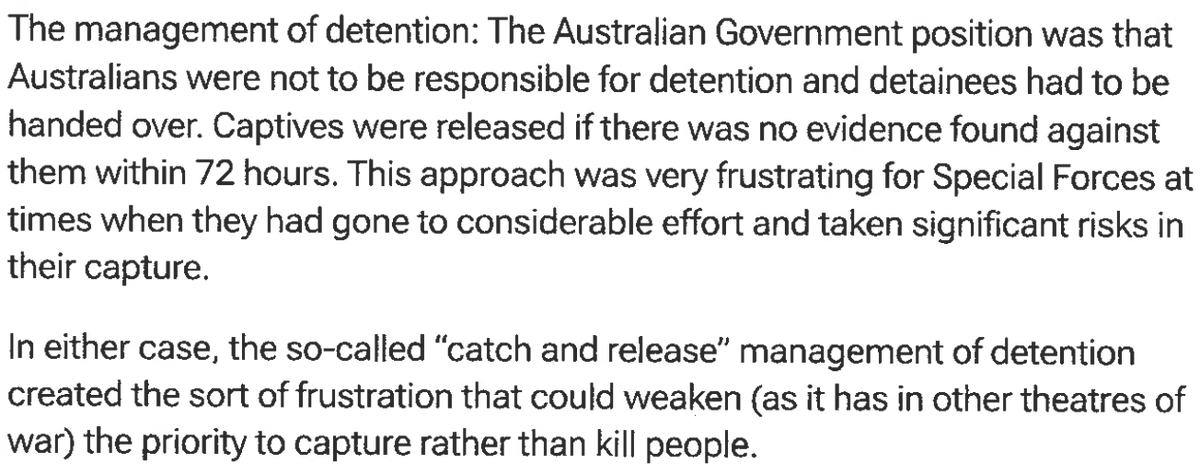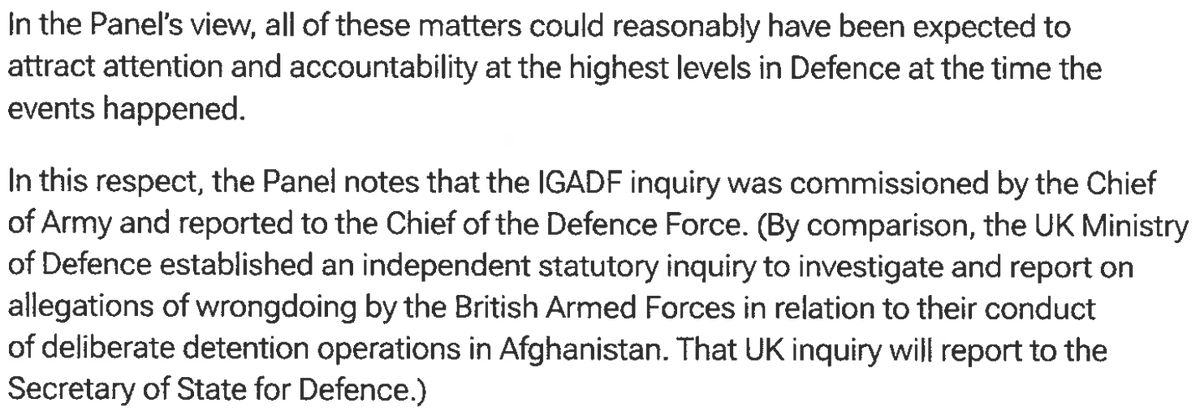A🧵 with some of the major revelations in the Afghanistan Inquiry Oversight Panel. Initially so much of the criticism seems to be directed against the strategic decision makers from about 09 onwards, most significantly then CDF and now GG David Hurley 

The ‘wavering moral compass and declining psychological health’ was well known within the command but, as BRS said to JTF 633 Commander Maj. Gen. John Cantwell in 2012 the SASR ‘weren’t allowed’ to have mental health problems…
The SASR unit psych told me there were ‘red flags’ all over the place, including widespread alcohol abuse, DV, obsessions with death, inc sharing of gruesome imagery and snuff porn. Guys were holding it together and then completely falling apart…
It’s so gratifying to see the report identified ‘an increased number of deployment waivers’ as a significant issue. I’ve been banging on about this… 

…since I found out the circumstances around the death of Sgt. Ian Turner. He was a wreck when he was sent off on Op Okra, having recently come out of a psych ward. He was issued a waiver so he could deploy- one of hundreds- then took his own life.
This waiver paper trail should be a significant part of the Royal Commission I think should follow. Where ever it goes (GG, Gen Campbell), a review of medals and honours should follow.
Interesting passage here about replacing the ADF’s ‘ethics doctrine’ which allows utilitarian decision making. This reminds me of a speech given by the man who commanded an SOTG that allegedly committed a large number of murders… 

Ian Langford discusses ‘situational ethics’ here which relates to the above. This raises the question of objective situational awareness- how many stories did you hear about Australian teams and platoons ‘almost being wiped out’ in Afgh?
cove.army.gov.au/article/ethica…
cove.army.gov.au/article/ethica…
This piece about super and benefits is interesting. Soldiers feared they’d lose super and benefits if they had a war crimes conviction. This fear would have stopped disclosure and assistance the OSI…yet the fear isn’t based in law. Why didn’t Defence tell them it wasn’t? 

This is incredibly significant. Counter-insurgency? Shaping, strategic, integrated. Counter-terrorism? Whack-a-mole, endless killing, constant sense of emergency. And wrong. Primarily the Australians fought local afghans in their own villages. 

Defence and government owed troops a strategic vision for victory. It’s in the ADF’s own leadership doctrine of jus in bello. They failed in that obligation.
More on the preference to kill suspected insurgents over detaining them or just walking past them, as the SASR did in Afgh in 2002 

And speaking of the preference to kill. Read about the admirable (but abandoned) SOTG Rule of Law Cell in my book Find Fix Finish. 

Real all about this in my book too. No adequate psych screening pre of post deployment, waivers for psych issues...command did not GAF about whether someone was psychologically or morally fit for deployment in Afgh 

Yep. Brits and Americans have been accused of the same crimes, on the same mission set, using the same cover up and it's been revealed British officers knew their SAS was in a 'extra judicial killing competition' with either us or the Americans. 

So..people knew. Those 'issues arising from operation reporting' would have been enough. The patrol reporting was clearly fabricated, yet nothing was done about. In the UK Inquiry they've uncovered emails between officers... 

...talking about the patrol reporting mass delusion that they're all meant to accept. The grab above probably relates to the Sola killings, and if people like Stephen Smith did an audit of patrol reporting then, they may have stopped the Darwan murders.
Shout out to my guy Abdul Gafar Stankzai, formerly the head of the Afghan Independent Human Rights Commission in TK and now living in Adelaide. He had so much of this right at the time, and when he tried to bring it to command, he was ignored. 

This may be the reason the report was considered to be prejudicial. The standard for war crimes command responsibility is 'should have known.' This may mean the Australian Head of State could have committed war crimes. 

Afterwards, a swipe at Brereton. If you really wanted to know what happened, you would have ordered a civilian review. We still could...an RC. 

The panel says defence didn't assume the command responsibility that a private company or a not for profit would. Let's keep in mind the wrongdoing here is mass murder. 

The Panel finds that Defence STILL does not accept culpability beyond the patrol level and that this affects veterans, soldiers and families. 

Wow, the panel says Defence's enabled omerta in Afghanistan existed before the conflict, resulting in the allowance of sexual and physical abuse for 'decades' 

This is absolutely damning to me. The Panel finds the ADF's ethics doctrine excludes natural law theory (which says ever human has inherent rights). 

I included a whole section in my book about Ian Langford's discussion of just war theory, and how I didn't believe the SOTG's and Australia's war in Afgh were consistent with just war theory principles.
FIN. I will come back to this. This report is consistent with my Find Fix Finish conclusions. I feel incredibly vindicated, but also infuriated. The ministers, the department and major media orgs could have found all this out more than a decade ago by just asking around.
• • •
Missing some Tweet in this thread? You can try to
force a refresh









